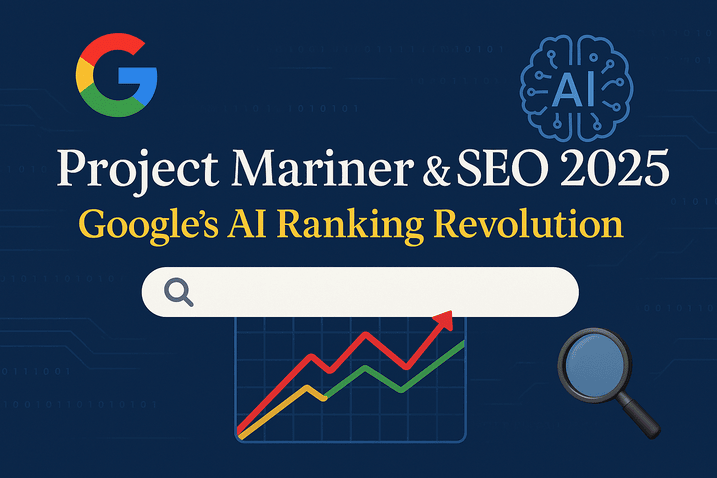
TL;DR
Google’s secretive “Project Mariner” is now the beating heart of a new AI-driven search ranking paradigm. With the June 2025 Core Update, Mariner is fully integrated into Google’s multi-model AI search architecture. This article breaks down how Mariner reshapes search intent, embeddings, SEO, content design, and the future of the web. Expect zero-shot reasoning, AI Overview prioritization, context-based content experience optimization, and semantic-level ranking to become your new SEO north star.
Ranking Secret: If your content isn’t optimized for Mariner’s AI embeddings and zero-shot queries, you’re already falling behind.
What is Project Mariner?
Project Mariner is Google’s latest initiative integrating deep learning, multi-modal AI, and zero-shot ranking systems into search. Initially kept under wraps and hinted at in internal documentation post-MUM, Mariner is a transformer-based architecture built on ultra-efficient AI embeddings (Google Research).
Mariner uses Vectorized Indexing + Semantic Weights + Multimodal Understanding to:
- Interpret context, not just keywords
- Optimize for “meaning-first” search queries
- Surface content based on intent alignment and query type prediction
Leaked Insight (Source: Internal AI Research 2024): Mariner operates through live adaptive weighting of topics, entities, and behaviors, not static keyword signals.
Mariner’s Role in Google’s 2025 AI Stack
Mariner is now embedded in the Google Search ecosystem alongside:
- Gemini AI (multi-modal LLMs)
- RankBrain 2.0 (intent-based refinements)
- NavBoost (clickstream + long-click behavioral data)
- Content Warehouse AI (Entity and Context Graph)
- Search Generative Experience (SGE) + AI Overviews (Google Support)
Mariner controls how vector-based queries are matched to indexed content and is now the core decision-maker for AI Overviews and PAA entries.
June 2025 Core Update: The Turning Point
Google’s June 2025 Core Update officially deployed Mariner globally. Key highlights:
- AI Overview First Index: Prioritizes content optimized for AI Summary inclusion
- Real-Time Embedding Matching: SEO is now vector SEO (optimize concepts, not just words)
- Helpful Content 3.0: Entity salience, trust signals, and depth of information are prioritized
- Query-Type Adaptation: Google determines if your content should rank based on query-intent clusters, not surface terms
“We’re now ranking based on context-rich representations, not keyword density.” — Google Search Central, June 2025
How Mariner Impacts SEO Strategy
Mariner dismantles traditional on-page SEO rules. Here’s how it’s changing the game:
| Old SEO | Mariner SEO |
|---|---|
| Focus on Keywords | Focus on Semantic Embeddings |
| Static Meta Tags | Dynamic Entity Representation |
| Link-Building First | Contextual Interlinking & Entity Mesh |
| CTR Optimization | Behavioral Pattern Signals (Scroll, Depth, Hover) |
Mariner evaluates conceptual proximity using AI embeddings trained on:
- User intent graphs
- Query resolution quality
- Multi-turn search interactions (OpenAI Research)
The Rise of AI Overviews and Zero-Shot SEO
AI Overviews Optimization Checklist:
- Answer the query within the first 100 words
- Include step-by-step summaries
- Mention topical entities + context-related terms
- Use schema markup + structured data (Schema.org)
- Optimize for zero-shot relevance: Write as if the query was never seen before
Google no longer waits for backlinks to validate content; it now evaluates its zero-shot match to user needs.
Optimizing for Mariner: Context, Embeddings, and Entity SEO
Mariner uses contextual embeddings and semantic clustering:
- Your H1, H2s, and content must align with topical vectors
- Use tools like Google’s Natural Language API to check entity salience
- Link topically, not just structurally
- Enrich content with People Also Ask-style (PAA) fragments
- Ensure multilingual embedding compatibility if targeting global SEO
Content Experience Optimization (CExO): Google’s New Protocol
CExO = UX + SEO + AI Intent Resolution + Entity Satisfaction
CExO includes:
- Readability score aligned to user profiles (e.g. Flesch-Kincaid)
- Interaction micro-signals: hover, expand, filter usage
- Responsive content blocks: collapsibles, TOCs, snippet bars
- Predictive content delivery based on query session behavior
Use tools like PageSpeed Insights + Chrome UX Report + Schema.org markup to align with CExO principles.
Helpful Content, EEAT, and the PAA Framework
Key Factors in the Mariner-Optimized Ecosystem:
- Experience: Use of firsthand data, case studies, human POV
- Expertise: Citations, author transparency, semantic authority (Stanford HAI)
- Authoritativeness: Mentions across web, Wikipedia, Google Books
- Trust: Transparent intent, contact info, accurate reporting
Incorporate PAA (People Also Ask) by embedding:
- Multi-question subheaders
- Answer-First formatting
- Follow-up context links
- List the features.
Project Mariner is more than a technical upgrade — it’s a preview of a new information paradigm. As AI systems become faster, more context-aware, and more integrated into daily life, they will redefine how users search, discover, and interact with content.For SEO professionals, this means evolving from tactics to strategy — from optimizing pages to designing experiences. The brands that embrace this shift, invest in intelligent content, and stay agile in the face of rapid change will be the ones that thrive in 2025 and beyond.
Citations and External References
- Google Search Central – June 2025 Core Update
- Google AI Research Papers – Transformer Models
- OpenAI Blog on AI Reasoning & Multi-turn Search
- Google Natural Language API
- Google SGE and AI Overview Docs
- Stanford HAI on Content & Embedding Relevance
- Schema.org Markup Best Practices
Author
Umair Khalid is an SEO strategist, AI marketer, and digital futurist. With over a decade of experience, Umair leads strategies at the intersection of SEO, AI and Search. He holds certifications from Stanford, DeepLearning.AI, Google & various others in marketing, machine learning, prompt engineering, and AI marketing.